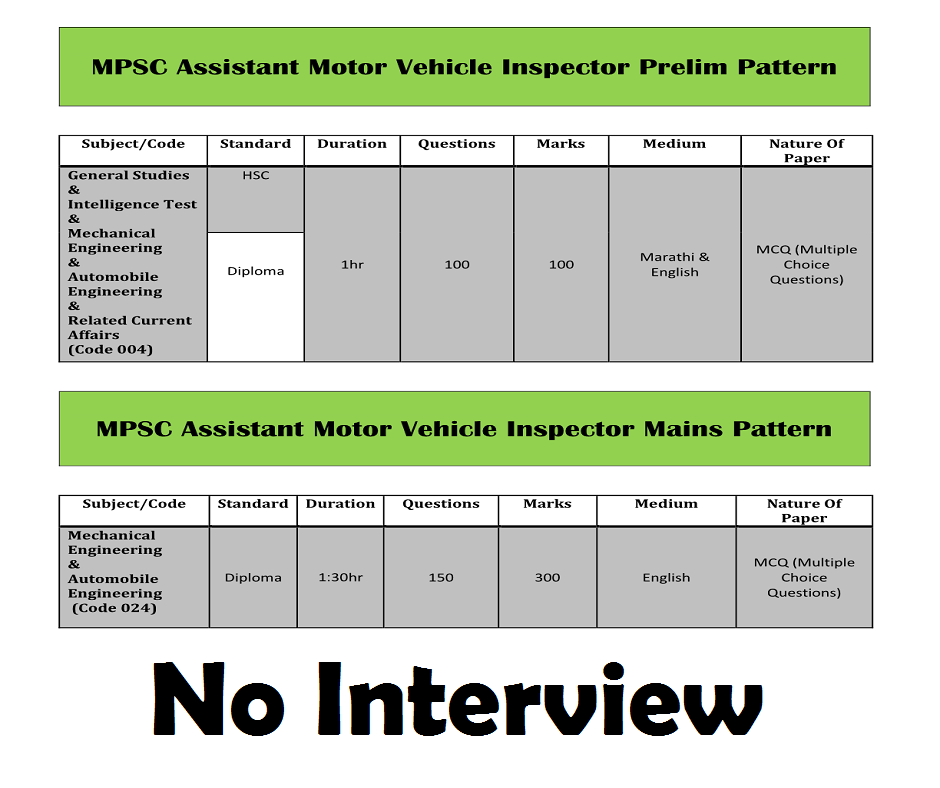Hello Everyone Welcome to MPSC Material. In This post you will find complete syllabus for MPSC AMVI exam including exam Pattern of MPSC AMVI (Assistant Motor Vehicle Inspector).
So, here is the Exam Pattern of MPSC AMVI Exam

So, Now you know the Exam pattern very well and we know that there will be only one paper in the prelim exam and one paper in mains exam of MPSC AMVI. and there is no interview. so here is your complete syllabus for MPSC AMVI (Assistant Motor Vehicle Inspector ).
MPSC AMVI Prelim Syllabus :
The syllabus of MPSC AMVI is simple as any other mpsc exam but the new topic in the mpsc amvi prelim is current affairs related to your post.
(अ)सामान्य अध्ययन
चालू घडामोडी, सामाजिक व औद्योगिक सुधारणा, सामान्य विज्ञान, भारताचा सामान्य इतिहास व भूगोल (महाराष्ट्राच्या विशेष अभ्यासासह), नागरिकशास्त्र.
२) बुद्धिमापन चाचणी
उमेदवार किती जलद व अचूकपणे विचार करू शकतो याचा अंदाज घेण्याच्या दृष्टीने सदर चाचणी मध्ये प्रश्न विचारण्यात येतील.
३) यंत्र अभियांत्रिकी व स्वयंचल अभियांत्रिकी संबंधित चालू घडामोडी
Latest trends and technological development in the field of Mechanical and Automobile Engineering.
MPSC AMVI Mains Syllabus :
Note: in the question Paper the questions From Section A are compulsory but Questions From Section B & Section C are not compulsory but you have to solve only one section (Section B only or Section C only) out of these two Sections.
Section A : Mechanical and Automobile Engineering – (120 Questions and 240 Marks)
- Strength of Materials :
Stress and strain, strain energy, shearing force and bending moment, moment of inertia, Principal planes and stresses, slope and deflection. Direct and bending stresses, Columns, Torsion and thin cylinders.
- 2. Mechanical Technology :
Engineering materials, Non chip forming processes, chip Forming process : Turning, Drilling, Milling, Boring, Broaching, Finishing and superfinishing, Gear production as well as NC-CNC and non conventional machining methods.
- Theory of Machines :
Kinematics and dynamics of machines, role of friction, different power devices and power transmission equipments such as governers, gyroscopes etc., Applications of cams.
- Hydraulics :
Fluids and their properties, Laminar and turbulent flow, Bernaulli’s Equation, Fluid pressure, Pascal’S Law, Surface tension, fluid flow and its measurement.
- Thermal Engineering :
Sources of energy : Conventional and non conventional, Laws of thermodynamics, Principle and working of heat engines, air compressors. Air Standard, vapor power and Gas power cycles.
6.
- Automobile Engines :
Theory, working and constructional features of C.I. and S.I. engines, Combustion phenomena and various ignition systems, Fuels and Lubricants, Performance and Testing of I.C. Engines, Pollution control.
- Industrial Electronics :
Diodes, UJT, BJT, amplifiers, microprocessors.
Section B: Mechanical Engineering – (30 Questions and 60 Marks)
- Hydraulic Machinery :
Impact of jet, Hydraulic turbines, Hydraulic pumps : Centrifugal, reciptrocating and other types. Hydraulic control circuits.
- Refrigeration and Air Conditioning :
Refrigerator and heat pump, Vapour compression and vapor absorption refrigeration systems, Refrigerants, Psychrometry, Air conditioning and its applications.
- Industrial Engineering :
Types of production, plant layouts, process planning, work study, statistical quality control, Metrology.
O R
Section C : Automobile Engineering – (30 Questions and 60 Marks)
- Automobile Systems :
Vehicle layout, Transmission system, breaking systems, ABS, Steering and suspension system, Chasis Frame and Body engineering.
- Vehicle Maintenance :
Performance of vehicles, engine electricals and electronics, workshop layout, repairing and servicing, Emission measurements and control techniques.
- Transport Management :
Elements of transport and its operations, Motor Vehicle Act, Taxation, Insurance.